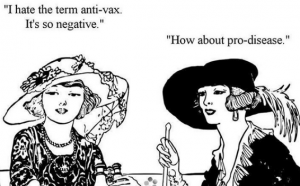The Big Deal
In recent years, the media has been swamped with stories concerning negative side effects of vaccinating children. The most common of these side effects includes the onset of autism. Media outlets, including the never variety of social media sites, have made the spread of opinion and “knowledge”, quick and easy, resulting in misguided beliefs and confusion. This has resulted in many people believing that it is unsafe to vaccinate their children, which in turn puts much of the population at risk. The “Anti-Vaxxers” as they’ve been dubbed, firmly believe that vaccinating a child, is contributing to their death.

Vaccine History in Brief
The idea of vaccinating began as early as the 1800s, when George Washington began having colonial troops inoculated against the smallpox virus. Over the years as science and technology grew, the development of vaccines occurred. In the 1960s, the United States government developed vaccination eradication plans, which involved a mandatory schedule for all children to be vaccinated against deadly, contagious viruses prior to entering school. Although slightly varied, this schedule is still in effect.
The Truth in the Matter
Despite the number of “Anti-Vaxxers” who firmly believe that vaccination results in disorders such as autism occur, multiple studies on vaccines, and their ingredients have shown that there is no directly link to autism. There is certainly risk with vaccination, allergies, infection, and potential death could occur, but the severe occurrences are few and far between. That being said the benefits of vaccination far outweigh the risks.
If you have concerns about vaccination, you should do the following:
- Seek advice from medical professionals only.
- Schedule an appointment with a pediatrician, who can discuss vaccination schedules.
- When researching information on the internet, obtain information from cited sources, that are scientific in nature, and a result of research.
- Avoid information found on social media sites that does not include any evidence to back up claims.
References:
Dixon, G., & Clarke, C. (2013). The effect of falsely balanced reporting of the autism–vaccine controversy on vaccine safety perceptions and behavioral intentions. Health Education Research, 28(2), 352-359 8p.
Evidence Shows Vaccines Unrelated to Autism. (2015). In N. Merino (Ed.), At Issue. Vaccines. Farmington Hills, MI: Greenhaven Press.
The Benefits of Vaccination Outweigh the Risks. (2015). In N. Merino (Ed.), At Issue. Vaccines. Farmington Hills, MI: Greenhaven Press.

Hi Melissa,
I thought when I saw how long the video was that I might not listen to all of it but once he started I found all of it very interesting! The biases can be very strong in people and the more you tried to convince them the more stubborn people get in their ways. Nice Job!